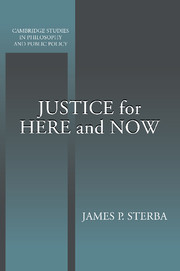Book contents
- Frontmatter
- Contents
- Acknowledgments
- 1 A Peacemaking Way of Doing Philosophy
- 2 From Rationality to Morality
- 3 From Liberty to Equality
- 4 From Equality to Feminism
- 5 From Feminism to Multiculturalism
- 6 From Anthropocentrism to Nonanthropocentrism
- 7 From Just War Theory to Pacifism
- 8 Conclusion: Justice for Here and Now
- Notes
- Bibliography
- Index
1 - A Peacemaking Way of Doing Philosophy
Published online by Cambridge University Press: 08 January 2010
- Frontmatter
- Contents
- Acknowledgments
- 1 A Peacemaking Way of Doing Philosophy
- 2 From Rationality to Morality
- 3 From Liberty to Equality
- 4 From Equality to Feminism
- 5 From Feminism to Multiculturalism
- 6 From Anthropocentrism to Nonanthropocentrism
- 7 From Just War Theory to Pacifism
- 8 Conclusion: Justice for Here and Now
- Notes
- Bibliography
- Index
Summary
Too often doing philosophy is modeled after fighting a battle or making war. Arguments are attacked, shot down (like a plane) or sunk (like a ship). Theses are defended, defeated, or demolished (like the walls of a city). Ideas (like people) are killed and destroyed. There are clearly problems with doing philosophy in this way. There is unfairness inherent in the practice, along with its tendency to undercut the possibility of reaching truly justified views, and, as I shall argue, there is a peacemaking alternative. Still the warmaking practice persists.
Just consider what not infrequently takes place at philosophy meetings. A young philosopher is making his first presentation. His paper is in philosophy of law and his argument relies on a range of judicial decisions. His commentator's objections, which are based on a number of different judicial decisions, are handed to him just before his presentation. Not knowing the particulars of the judicial decisions to which his commentator refers, he is unable to offer a defense of his view. Usually, of course, things are not quite this desperate. Comments do tend to come in late, not infrequently just before the session at which they are to be presented, but speakers do manage some kind of a response, although not a very reflective one. The lateness of the comments, however, does put speakers at a disadvantage with respect to their commentators, and this frequently seems to be an intended result as well.
- Type
- Chapter
- Information
- Justice for Here and Now , pp. 1 - 13Publisher: Cambridge University PressPrint publication year: 1998



